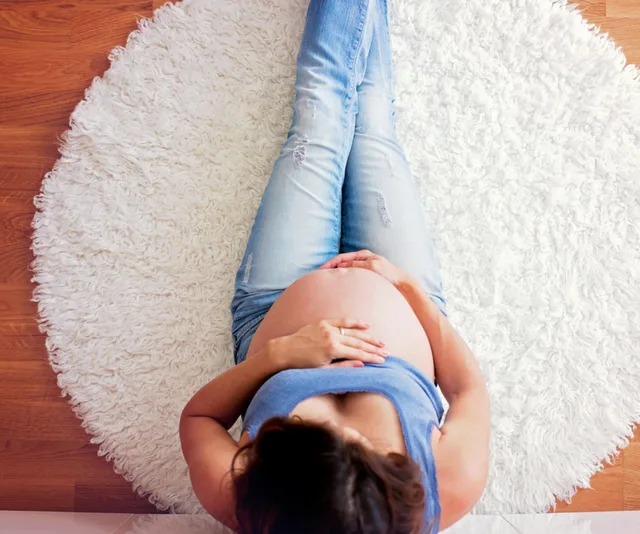Health niggles are part and parcel of pregnancy for many women, and most of the time they’re nothing to worry about. Occasionally, however, they’re a sign that something serious is wrong.
As a rule, you should always seek medical advice if something’s worrying you. ‘Sometimes you may not even be sure what the problem is,’ says midwife Helen O’Dell. ‘But if you feel something is just not right, get it checked out.’
The best thing you can do to stay healthy is attend your antenatal appointments, which will check your and your baby’s wellbeing. This is often when problems are detected.
Abdominal pain
In very early pregnancy it’s perfectly normal to have cramps similar to those you get before a period. As your body grows to accommodate your baby, you may also feel discomfort. But severe or prolonged pain should always be checked out.
Warning signs
Call a doctor if you experience any of the following:
Persistent cramping, especially in early pregnancy, with or without bleeding.
Severe pain on one side, with or without bleeding. This may indicate an ectopic pregnancy, where the embryo implants outside the womb, usually in one of the fallopian tubes.
In later pregnancy, abdominal pain with bleeding may be caused by the placenta coming away from the uterus wall, a serious condition that requires immediate medical attention.
Pain high under your ribs. This can be a sign of pre-eclampsia and should always be checked out by a doctor.
Itchy skin
As your tummy grows and the skin stretches, it may feel tight, dry and itchy. Using moisturiser every day can help to relieve this.
Warning signs
Severe itching all over your body can be a symptom of obstetric cholestasis, a rare but dangerous liver disorder that can strike in the third trimester. It needs immediate monitoring and may mean your baby is delivered early.

Pregnancy can bring with it a host of aches, pains and curious ailments.
Dizzy spells
Feeling light-headed is fairly common in pregnancy because of the extra demands on your circulatory system. Low blood sugar is another cause; small, regular meals may help. Drink plenty of water too, as dehydration can make dizziness worse.
Warning signs
The cause and meaning of your dizziness may depend on the stage of your pregnancy.
In early pregnancy especially, call a doctor if you experience unusual dizziness or weakness. It can be a symptom of ectopic pregnancy, in which the embryo grows outside the womb in the fallopian tube. If left untreated, it can cause the tube to burst.
In later pregnancy, dizziness can be a symptom of pre-eclampsia.
Dizziness accompanied by bleeding and/or abdominal cramps could be a sign that the placenta is separating from the wall of the uterus. You should seek help urgently.
Headaches/visual disturbances
Headaches occur for many reasons during pregnancy, including stress, tiredness, dehydration and low blood sugar. Visual disturbances are also quite common because your eyes are affected by fluid retention. Some women who suffer migraines accompanied by visual disturbances may do so more frequently during pregnancy.
Warning signs
A headache that persists for more than a few hours, or is accompanied by visual disturbances such as flashing lights or spots in front of the eyes, can be a sign of pre-eclampsia. Call your doctor immediately.

The best thing you can do to stay healthy is attend your antenatal appointments.
Vaginal bleeding
Bleeding in early pregnancy isn’t uncommon, especially at the time your period would normally be due. There are many times, however, when it can mean something >more serious.
Warning signs
You should always get any vaginal bleeding checked out during pregnancy.
In the first trimester, bleeding can sometimes but not always be a sign of miscarriage.
Bleeding later in pregnancy can occur if the placenta is lying across the cervix, a condition known as placenta praevia. This condition must be closely monitored.
In late pregnancy, bleeding with abdominal pain can be a sign that the placenta is coming away from the uterus. This is very serious and needs prompt medical attention.
At the end of pregnancy, a blood-stained discharge could be a ‘show’ a sign your cervix is preparing for labour.
Vaginal discharge
Increased vaginal secretions are normal in pregnancy and are usually nothing to worry about.
Warning signs
If you experience vaginal discharge that smells offensive and you’re sore or itchy, you may have a fungal or a bacterial infection. It’s important to get this treated as soon as possible, so see a doctor.
A gush or steady leakage of fluid from your vagina may mean the bag of waters around your baby has ruptured. If you’re less than 37 weeks pregnant you’ll need to be monitored.

You should always get any vaginal bleeding checked out during pregnancy.
Severe vomiting
Nausea, with or without vomiting, is a common symptom of early pregnancy and is usually nothing to worry about. Resting, drinking fizzy mineral water and eating small regular meals have all been shown to help relieve it.
Warning signs
Although vomiting is common, there are still circumstances in which you should seek medical attention.
Occasionally an exaggerated form of pregnancy sickness, known as hyperemesis gravidarum, develops. Treatment may be necessary to prevent dehydration and malnutrition.
Very rarely, vomiting that develops in the last three months and is accompanied by pain in the upper abdomen can be a symptom of pre-eclampsia. Seek urgent medical help.
Swelling
Some fluid retention and swelling is normal during pregnancy, especially during the last few months.
Warning signs
Swelling of the hands and face, or sudden excessive weight gain (due to fluid retention), can all be symptoms of pre-eclampsia and need urgent investigation.
Excessive thirst
It’s important to keep your fluid intake up while you’re pregnant as it may help to avoid fluid retention, dehydration and constipation.
Warning signs
If you experience extreme thirst it can be a symptom of gestational diabetes, when the body doesn’t produce enough insulin to cope with increased blood sugar levels. If spotted it can be controlled; if left untreated it is potentially serious.
Extreme fatigue
Your body is working hard to support your growing baby, so you’ll probably feel much more tired that usual. As a result you may find you need to rest a lot so make it a priority.
Warning signs
If the fatigue is severe and you feel faint, breathless and are possibly having palpitations, it may be a sign of anaemia. Your doctor may advise you to take iron supplements.
Backache
The weight of your growing baby can make it difficult for you to maintain good posture, which often results in backache.
Warning signs
Backache accompanied by fever and/or pain when you wee could be a sign of a kidney infection, which can lead to premature labour. Such infections are often caused by untreated urinary tract infections, which is why it’s important to see your GP if you experience pain or burning when you wee.

